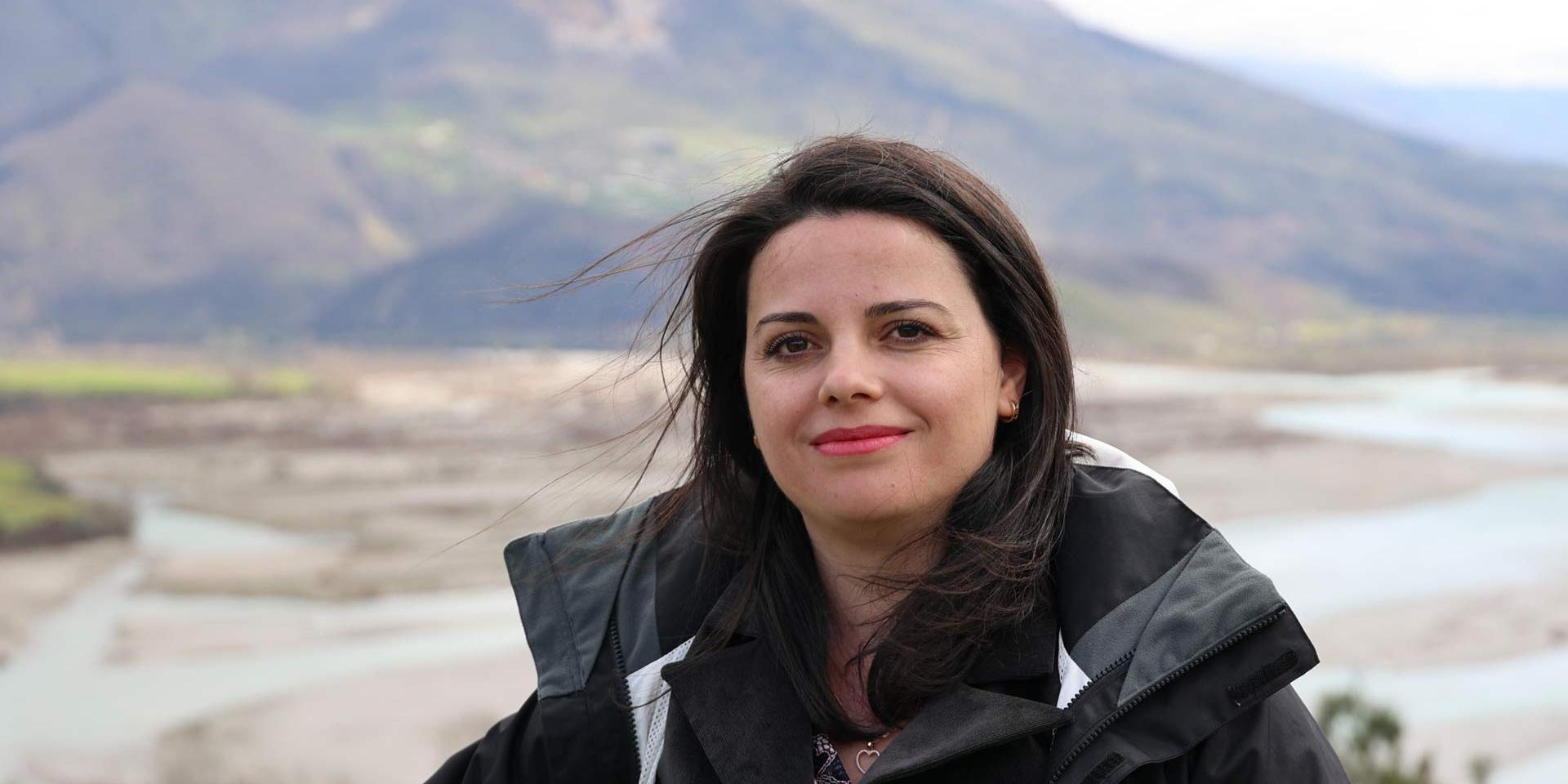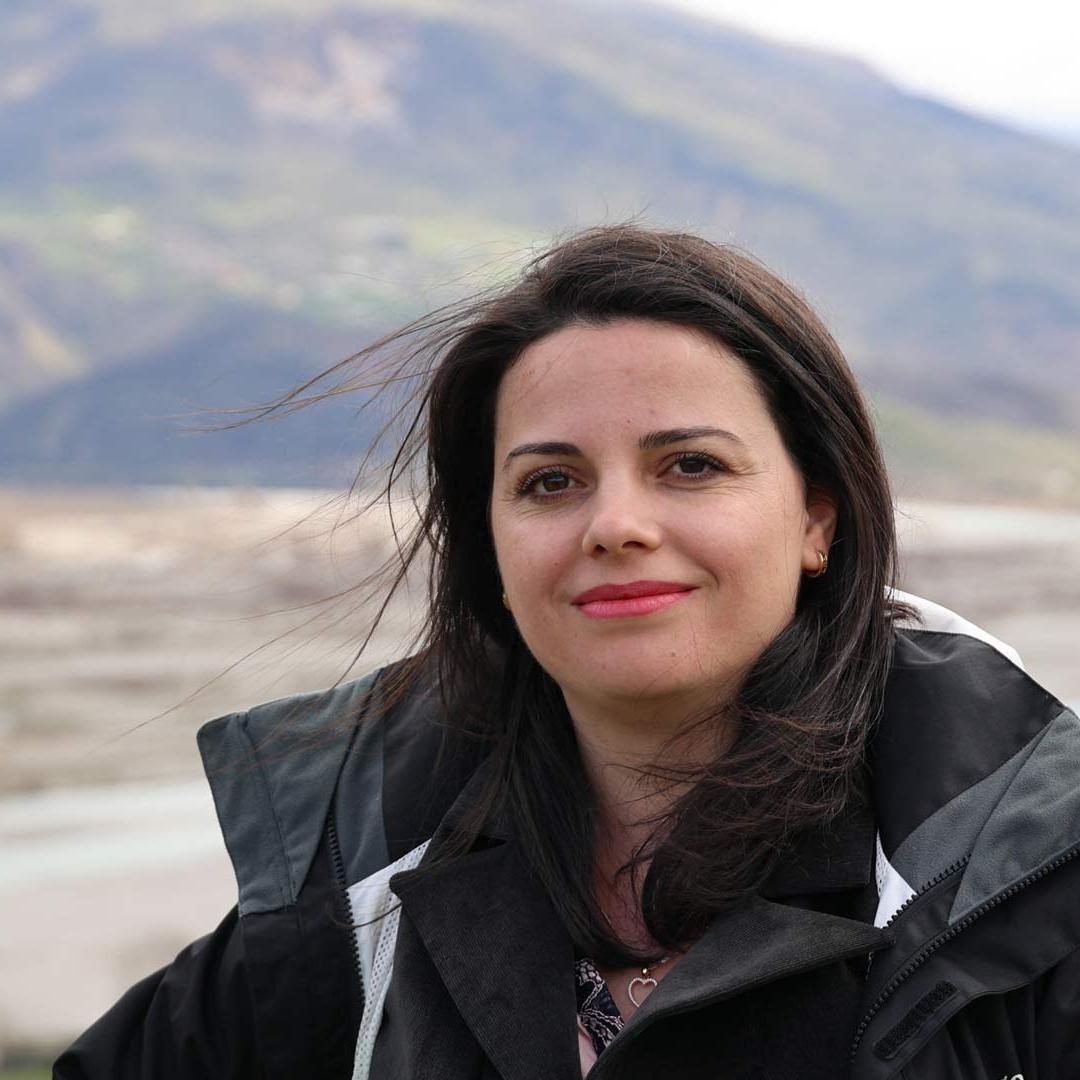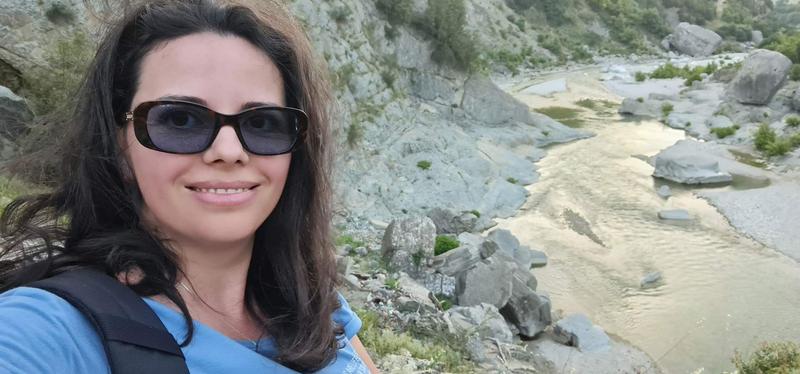In the series of articles ‘Inspirational women in nature conservation’, we highlight women who are bringing about positive change with passion, courage and vision and making a significant contribution to the protection of Europe's nature. To kick off the series, Besjana Guri talks about what it means to be a campaigner for free-flowing rivers in a country like Albania.
‘When something fulfils you, your enthusiasm carries others along with you’
As a woman in Albania, I imagine that being active in nature conservation is a challenge. Is that the case?
It is challenging, especially when you are doing campaigning work. You are out at grassroots level, often in rural areas, and in a patriarchal environment. Especially as a young woman, it's hard to be taken seriously. I was lucky that I was always travelling as part of a team and had great support from my partner, my family and many other people. They all motivated and encouraged me. But if you don't have a network like that, you can't do this job as a woman in Albania. It is even more difficult if you are a mother.
Your daughter is now seven years old. What has being a mum changed for you?
On the one hand, I am even more motivated and passionate about it because my daughter has made me realise what it means to think about the next generation. But it's also challenging with a small child. Sometimes you miss crucial moments while you're doing your job. So when my daughter was able to speak and said: ‘Why are you leaving? Stay here!’ it wasn't easy for me.
Are there women who inspire you as role models?
I don't have a specific role model, but in a way my family is my role model. The way I was brought up has helped to give me strength, even when things get difficult – a sense of fairness, confidence in my abilities and ultimately a willingness to work hard.
Does your example encourage other women to follow similar paths?
When I am invited to panels, sooner or later the question always arises as to whether it is difficult for a woman to do this job. This kind of question shows me that women are inspired by me. I never intended to become one of the main faces of the Vjosa campaign. I don't know why I didn't see myself in this role, maybe it's something typically female. I don't regard myself as a role model, but others obviously want to learn from my experiences.
-
About the person
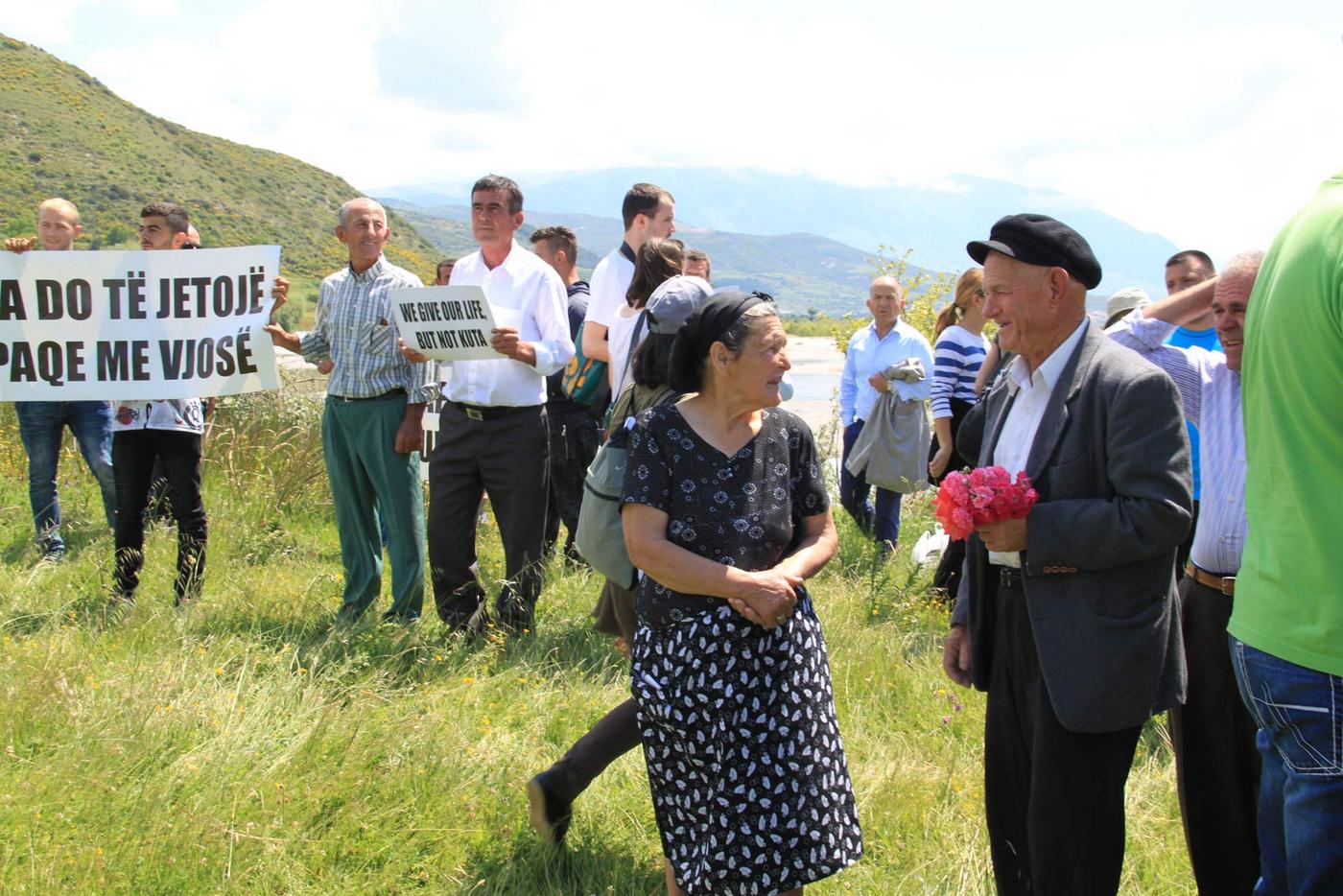
Protest action by the local population in favour of the Vjosa.
© Andi GötzToday, you appear on talk shows and discussion panels on major TV channels and talk about the Vjosa. Have you always been so self-confident?
No, in the early years of the campaign I was actually very insecure, not least about my abilities. I didn't know myself very well yet. When we started the campaign, I was very young, only 26, and it was a completely new experience for me. I was just sure that I really wanted to do something for the environment. I grew up in a small town, regularly visited my relatives in the mountains and have always had a special relationship with nature. At the time, I didn't realise how much the Vjosa would shape my life. It is important for me to emphasise that we fight for the Vjosa as a team, where everyone makes their own contribution. I think the secret of our success is that our campaign team is made up of a whole variety of different personalities and skills.
In your opinion, what qualities do women bring to the nature conservation movement?
Female energy often has a balancing effect in difficult situations. We women are usually more peaceable than men. I would say that is one of the most beautiful female qualities. We de-escalate, we tend to think outside the box by thinking long-term and planning with foresight. I think that's in the nature of women. My personal strength is empathy. It helps me to connect with people, and that also applies to our team. I would never make the mistake of starting a battle of the sexes. It's about complementing each other.
Being empathetic is a great strength, but it can also be challenging. How do you feel about that?
It's definitely both. I find it easy to build bridges with other people, a very important aspect in my work. We can't look at nature in isolation from people. You have to get in touch with those who live in these areas. Even if they don't immediately understand the implications of what you want to convey to them, they are the ones who can make the most difference. What is challenging? It's too easy for me to feel overwhelmed by the emotions of others - for example, if I let the worries and difficulties of people affected by hydropower projects get to me too much. Moments and situations can touch me deeply, but ultimately, I also see that as positive. Difficult experiences spur me on even more to make changes.
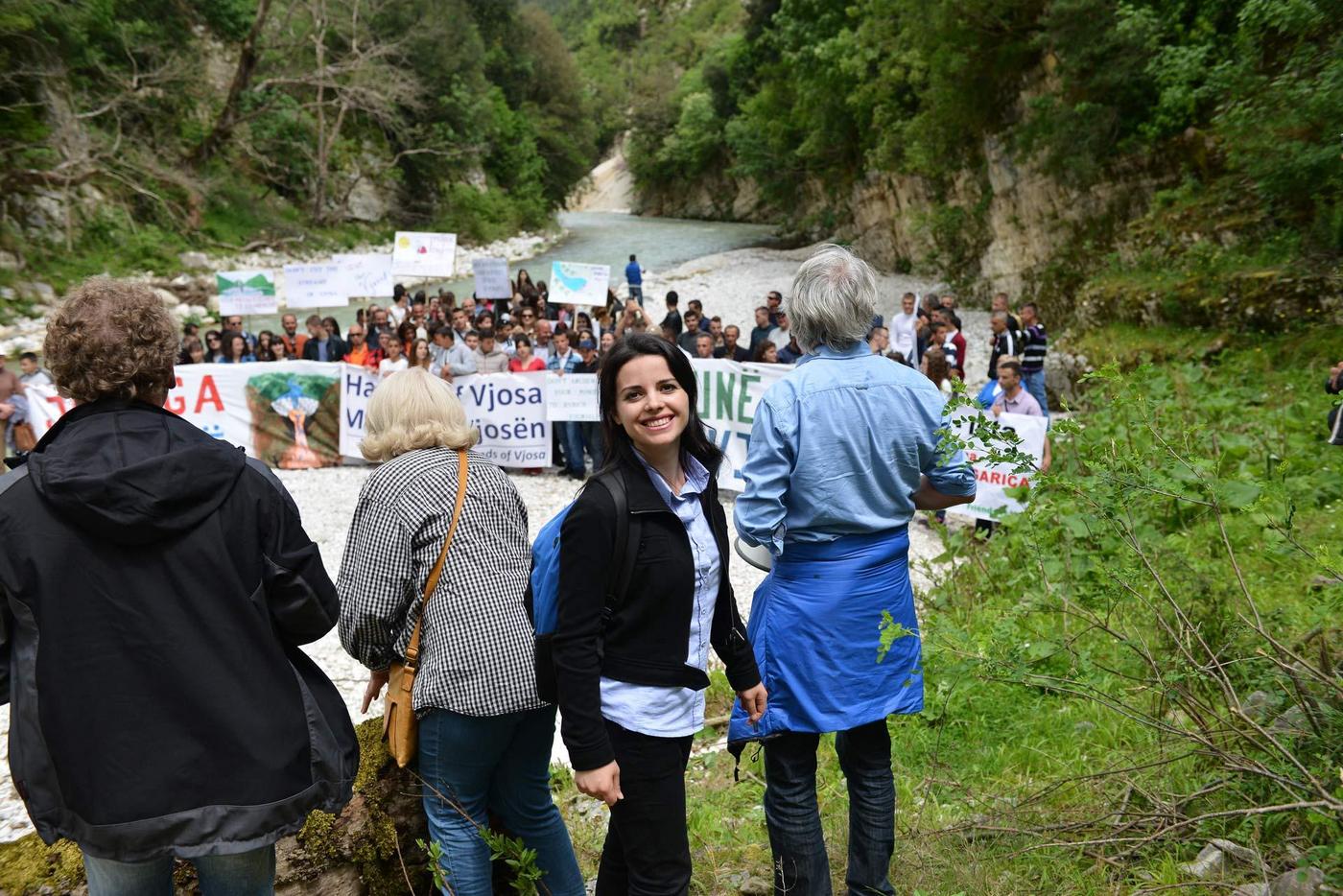
Besjana Guri at a protest against dam projects on the Vjosa.
© EcoAlbaniaYou described how people in rural areas didn’t take you seriously at first because you are a woman. Did your willingness to engage with others open doors for you?
Yes, I think so. Being regularly present in the communities in the Vjosa Valley and letting them know that I want to support them in solving their problems helped people accept me. If you try to build a real connection with them, if you ask them what they need and help them organise a protest, for example, then they take you seriously.
As an important figure in the ‘Save the Blue Heart of Europe’ campaign, you are sticking your neck out. To what extent do you feel that you are opposing projects that influential people want to profit from?
That has always been a slight concern for me. I'm constantly in the media, I'm taking part in protests and so on. Fortunately, I haven't had any problems yet. Having EcoAlbania, EuroNatur, Riverwatch, Patagonia and all the other partners behind me makes it easier. The campaign is huge and gets a lot of public attention, which also means safety in numbers. If I were alone or we were just a small group, the situation would be different. It's particularly risky for women to be in the limelight, because there are lots of ways to bring you down. It's easy to hurt you on a personal level via social media or with the help of new technologies. If this happens to a woman, especially here in Albania, it means the end of her life in the public eye.
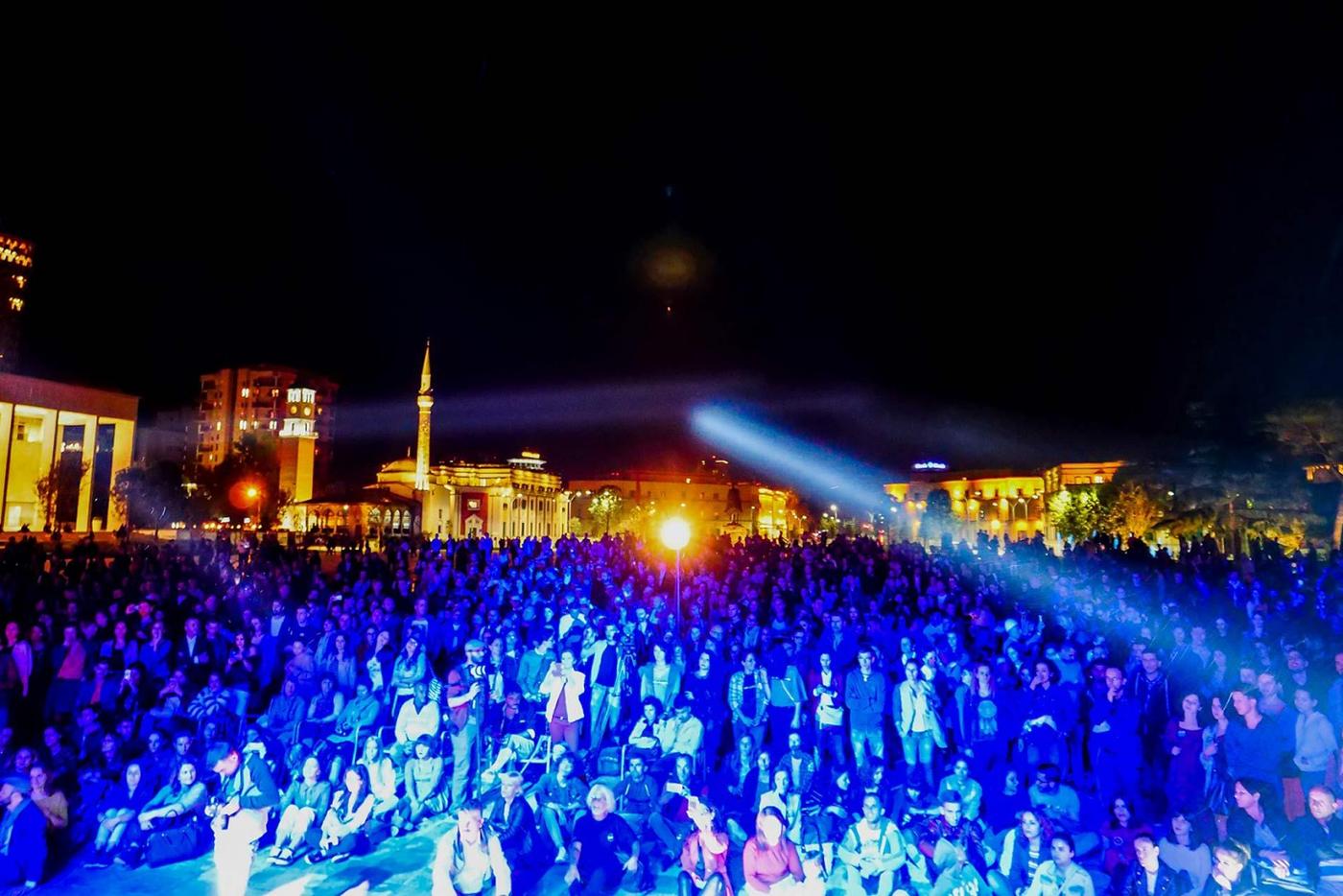
Vjosa concert on Skanderbeg Square: Seeing this crowd from the stage sent shivers down Besjana's back.
© Adrian GuriIs there an event that has clearly demonstrated that you and your fellow EcoAlbania members are not alone?
One of the best moments was the Vjosa concert in Tirana in 2017 - that was huge. I took care of the organisation and was seven months pregnant at the time. Skanderbeg Square was full. Around 4,000 people were there and everyone was singing ‘Vjosa, Vjosa’. At the end, we went up on stage as a team to sing along to the last song. We saw the crowd applauding from up there. That was one of the greatest moments for me. I realised then how much we had already achieved. That gives you strength because it shows you that you are making a difference. At the beginning of the campaign, we were told so often that we were blocking the country's development because we were opposing the expansion of hydropower.
Last year, ‘The courageous women of Kruščica’ (editor's note: 2019 EuroNatur award winners) travelled from Bosnia-Herzegovina to the Shushica in Albania. What was that like?
We invited them to Shushica because it's completely different to the situation in Kruščica. Here it's only men who protest and the women are invisible. Our idea was to motivate the women in Shushica with the story of the women of Kruscica. I only knew them from the film ‘Blue Heart’, but every time I saw this passage in the film it made me cry. It's incredible what these women have gone through, and I have great respect for them. I was very lucky to meet at least two of them in person. This was important because people feel so much stronger knowing that they are not alone in this struggle.
What has been the most important moment in the Vjosa campaign so far?
I would say there have been two. The first was in 2017, when we won the court case against the Poçem hydropower project. That was the first ever court case against an environmental project in Albania. I was heavily involved in working with the local population at the time and was so happy for the people. We received many congratulations and so many phone calls. It was as if I had just got married (laughs). The second moment was the designation of the Vjosa Wild River National Park in 2023. Achieving something you have dreamed of for ten years is an overwhelming feeling.
The current developments in Albania are worrying, especially the growing pressure on nature due to the expansion of tourism. Is the Vjosa story still a success story?
Yes, since the designation of the national park, there has been a lot of media coverage, things have started to happen and new initiatives have emerged. We have become a source of inspiration and a role model for other NGOs in Albania and beyond, and not just since the designation. The Vjosa National Park has the potential to become a role model for successful river protection in Europe. But the Vjosa still needs us! Admittedly, when the national park was designated, I had hoped that now I could finally contribute my energy in a more constructive way. Then we were confronted with the news that the water of the Shushica, one of the most important tributaries of the Vjosa, was to be diverted for tourism infrastructure on the coast and we had to start protesting again. This setback was a terrible blow. But we have picked ourselves up again and continue to do our best.
What helped you personally to find this motivation again?
It wasn't easy, but I love what I’m doing. I could have said many times: I don't want to do it anymore, it takes too much energy, I even dream about the Vjosa at night. But I can no longer imagine not being involved with the Vjosa. It has become my life's work, my mission.
Suppose one day your daughter were to tell you that she wants to follow in your footsteps. How would you react?
I think I would be proud of her. I would share my experiences with her and support her.
If you were to write something on a billboard in Tirana to encourage other women, what would it be?
Follow your dreams, follow your inner voice! Focus on what you really love and really want to achieve! If you find something that fulfils you, your enthusiasm will carry others along with you.
Besjana, thank you very much for this inspiring interview!
Interview: Katharina Grund



